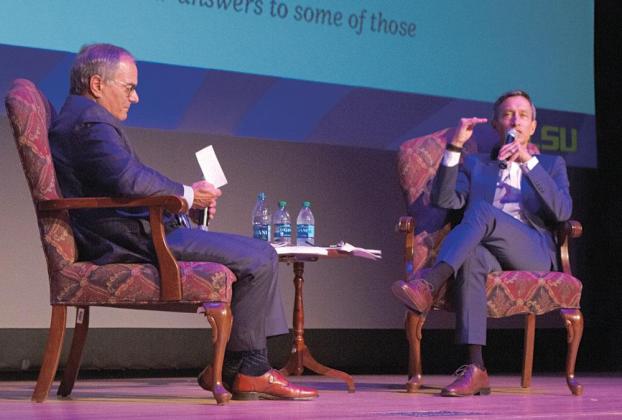
Jackie DeRobertis and Abbie Shull / LSU Manship School News Service
James Dao, opinion editor of The New York Times, on Tuesday acknowledged the risk of using anonymous sources but said it was necessary to disclose the quiet resistance within the Trump administration.
Dao’s remarks focused on the contentious anonymous Op-Ed piece published last month by a senior Trump administration official who was critical of the president’s policies.
“This was one person’s effort to reconcile an ethical dilemma they were having,” Dao said.
The piece referred to the so-called “steady state” operating in and around the White House to curb the president’s policy decisions.
Questioning Trump’s fitness to run the country, the official cited the president’s erratic behavior and the panic within the administration to protect America from perceived damage.
The author also mourned a decline in civility across the country, closing with a push for bipartisan cooperation in a polarized climate.
Dao said he was comfortable with the criticism of the piece from both liberals and conservatives because “it made people think.” Conservatives called the writer cowardly for not using his name, while some liberals argued that he should have spoken on the record and then resigned.
Dao said that the Op-Ed page was intended to diversify opinions and provide a broad range of perspectives, even those with which the reader does not agree.
“It is only in our national conversation, in the battle of our collective ideas, and the broiling arena of our civil life that the truth can emerge,” he said.
In a discussion with LSU journalism professor and former New York Times editor Len Apcar, Dao got into the details of how to approach anonymous sources. He explained the conundrum involved when a news organization tries to protect the identity of someone.
“The goal is to be as precise as possible in a way that is as protective as possible,” Dao said.
Dao also addressed the critical decision to publish the Op-Ed anonymously and shared that there was a consensus among his bosses to go forward with it.
“We really felt strongly that we were willing to put our integrity and the integrity of the New York Times on the line, because we believed in the integrity of this author and the authenticity of the author.”
Dao added that the paper felt this was a “unique moment” given the division in the country and concerns about the president’s behavior.
Apcar asked about the anonymous source’s use of the word “many” in describing the number of senior officials who shared the Op-Ed author’s concerns about Trump.
Dao acknowledged that “many” is a “fuzzy word” and said the writer was referring to “more than a handful” of people.
Dao responded to further questions from the audience about subjectivity, polarization and open-mindedness in public discourse. Many questions referenced the growing distrust of the media.
Dao’s appearance came at the end of two days of panels on voting and other political issues that LSU called “Behind the Ballot.”
Earlier in the day, a panel of media experts discussed the role of journalists today as they deal with nearly constant criticism from President Donald Trump.
Amy Brittain, a Shreveport native and alumna of LSU who is now an investigative reporter at The Washington Post, said journalists do not take the president’s words about the media personally.
“All we can do is report on it and report on the information that’s being said by the president,” Brittain said.
Melinda Deslatte, who has been covered Louisiana politics for the Associated Press for almost 20 years, said her organization has never had an “agenda.”
“If somebody says something that is demonstrably false, that is not backed up by facts, then that is part of what we do,” Deslatte said. “I think we have done that for years. I do not think that has changed just because the political climate has changed.”
Brittain and Quint Forgey, a Baton Rouge native and LSU alumnus who now works for Politico, both said that “we are living in extraordinary times.” But Peter Kovacs, the editor of The Advocate, did not agree.
“I just do not buy the idea that our country is more corroded than it has ever been,” Kovacs said. Kovacs said things may have been more divisive during the Vietnam War. “We have always had an element of violence and hostility in working out our differences.”
